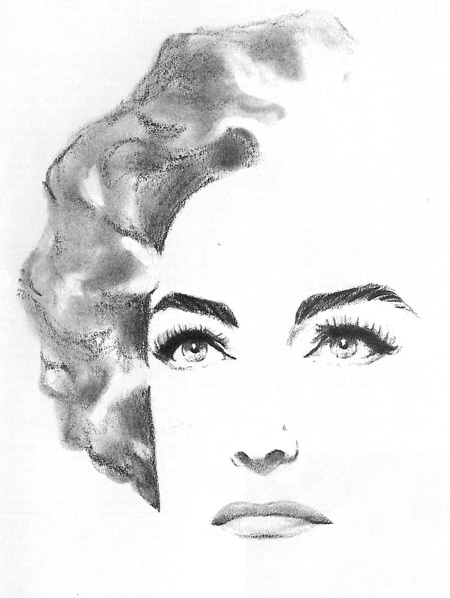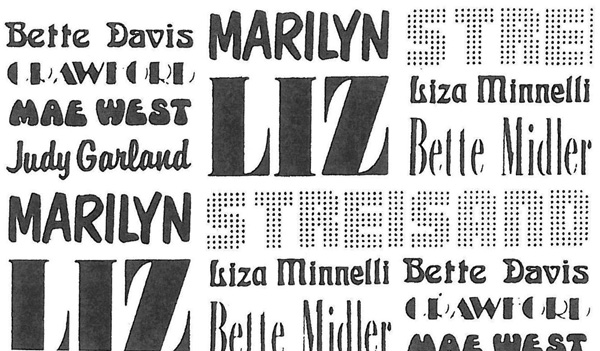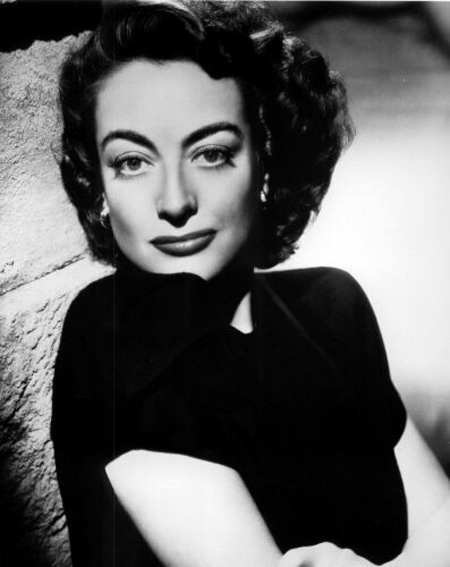BijouBlog
I Love You, Joan Crawford: Gay Men and Their Big Ladies

The other day while on the subway, I heard two male high school students (not sure if they were gay) debate the respective virtues of Beyonce and Adele.
Diva worship is apparently still alive everywhere, not just in the gay community!
But what's the real scoop on the cliched gay obsession with Joan Crawford and other dead or superannuated movie stars, or as movie mogul Jack Warner put it more bluntly, “old broads,” the language he used when referring to Bette Davis and Joan Crawford in What Ever Happened to Baby Jane?
These larger than life ladies, and others like them, have always enjoyed large gay male followings.
So my question is: is the “big lady” and her gay entourage now a stereotype of a campy, closeted culture of the past, in which diva worship, according to many cultural critics, was an elaborate “covering” dynamic for gay men's profound social and psychological insecurities?
The September/October 1977 issue of In Touch Magazine, in those early days when the magazine offered an array of cultural features, offers a tribute to Joan soon after her death, and, most significantly, before the now notorious book and camp cult classic Mommie Dearest came out.
This article pretty much rehashes many of the claims made about the late movie legend, such as director George Cukor's paean to her face, “that extraordinary sculptural construction of lines and planes,” her superlative (and some might argue, obsessive) projection of stardom, and her continual reinvention of her image.
She was the vibrant jazz baby; the assertive shopgirl who made good and got her man while fighting for her rights; the stylish, glamorous, yet suffering and vulnerable femme fatale; the Gothic horror queen.
Gay men found in these personas something they could identify with in their own struggles for individual identity and social respect.
For gay men, Joan was the star and, for many, still is the star - that luminous, glamorous figure swathed in furs and jewels, kind of a fairy queen, remote but also approachable. Joan was approachable, even if she did supposedly get dressed up to go to the grocery store; she answered ever fan letter personally, sustained relationships with fans, and she would even thank you for a thank you note! "Goodbye, Joan" is the title of the article, and the author once again quotes the gay George Cukor, who expresses disbelief that the legend had actually died.
Joan, of course, lives on in the movies and a caricature of her lives on, as well; the wire hanger and can of cleanser wielding monster of Mommie Dearest becoming one of the biggest gay camp icons ... ever. And a new generation can still see her (if they want to) on Turner Classic Movies, on DVD reissues, and on youtube.
But do the “old broad divas,” especially Crawford, with their larger than life personas, over the top (to many eyes and ears these days) characterization and dialogue, and often striking personal and professional flaws and vulnerabilities, really appeal to today's smoothly tech-savvy, more easily assimilated gay man?
Yes, I love Joan Crawford, even if I can also also laugh at the melodramatic excesses. But how often in the life we live (as opposed perhaps to the life we dream), can we tell someone off like Joan does in Autumn Leaves, calling someone a slut twice in one harangue? (And not playing for the cameras on a reality TV show!).
Most people end up dying in sterile hospitals looking like a pincushion of tubes, or on the toilet; so who wouldn't want to drown on a gorgeous, moonlit beach with a violin playing theLiebestod in the background, like Joan does in Humoresque?
And Joan could laugh at herself, as she does in It's a Great Feeling, when she delivers a slap and says that she does that in all her movies. “Get out Veda! Get out before I throw your things into the street and you with them! Get out before I kill you!”
The point of this blog is not self-analysis, but if Joan Crawford worship is part of my gay unique sensibility, then so be it. Maybe I was born with it, or is it a social construct because of my generation? And of course, one can also mock the Joan Crawford obsession as a gay cliche, as Debbie Novatny in Queer as Folk says to her brother, when he asked her if she wanted to stay home and watch a Joan Crawford festival, “No one's that gay!”

For a while, up to the early 90s, a new type of diva, like Streisand, Cher, Bette Midler, and Madonna, looked to replace, or perhaps supplement, the more traditional Barbra, Judy, Bette, and Joan as divas with that gay following, according to Michael Kearns in an article entitled “Heroine Worship” in the November 1984 issue of Male Review.
But in 2014, who is the new fairy queen or queen of the fairies (pun intended)? Is that image and its associations even relevant in this culture?
The author Ethan Mordden, in a past issue of Opera News, focused on another type of diva with a gay following, the female opera singer (think Maria Callas, especially). He recounts that, at a recent dinner party, he deplored the type of gay man who mimics his diva of choice, sprinkling his conversation with “darlings,” pretending to be Auntie Mame. In other words, perhaps he is implicating the “older” gay men in the closet who identities with the diva in all her flaws (but also her assertiveness), taking on a mask to cover his feelings of oppression and discrimination. The younger gay men at the party did not know who Auntie Mame was. Gasp!
A younger employee of the Bijou confused Betty White with Bette Davis. Does he deserve the mockery his mistake created? Or are the older gay men, those “old queens,” the ones to be mocked and pitied for their now outdated diva worship that reeks, like Norma Desmond's tube rose perfume in Sunset Boulevard, of the pre-Stonewall closet?
All cultures undergo transformations in response to a complex variety of factors. But I do wonder if the lack of the old variety of diva worship in gay culture is a simple either/or, now/then issue. Generation Y and the Millenials may not subscribe to the same values as preceding generations, but I do find some fault with the “ahistoricism” of said group, that somehow they have outgrown the old gay icons or replaced them with others less gay orthodox campy.
Yet even if the whole culture sees something like Joan Crawford worship as camp or kitsch, or even if some gay “hipsters” appropriate such imagery inauthentically as only parody, to deny even a glimpse of the power and beauty that these women uniquely conveyed to previous generations is a sad loss.
We are so afraid of the grand gesture, the big emotion that these big ladies could generate, somehow seeing it as false or hollow or silly or politically incorrect. Perhaps we have cheapened big emotions with reality TV, with American Idol and Dancing with the Stars, where everyone, not just the few larger than life stars, can groan and weep and spit out insults for the omnipresent cameras.
Does being liberated from social oppression mean a liberation from .... feeling? Perhaps we can't truly experience the high without experiencing the contrast of the low.
But as I see it, one of the great cultural enjoyments is to let yourself experience the campy pleasures of truly big, talented personalities.

When you subscribe to the blog, we will send you an e-mail when there are new updates on the site so you wouldn't miss them.

Comments